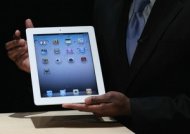What he brought to Apple was a fierce commitment to see the world honestly through the eyes of the customer and to do whatever was necessary to delight them.
The shift to radical management
Why is this so rare? It’s because most of the top executives in the Fortune 500 are still looking at the world from the perspective of, “What’s good for my shareholders? How can I make more money for them?” They haven’t yet grasped that the world has changed. With the epochal shift in power in the marketplace from seller to buyer, we have moved from the Age of Shareholder Capitalism to what Roger Martin in HBR calls the Age of Customer Capitalism. Most of the Fortune 500 are still practicing traditional management rather than radical management.
Steve Jobs embodied the shift to radical managment and showed how much money could be made in doing so. He is not alone. Jeff Bezos at Amazon [AMZN] and Marc Benioff at Salesforce [CRM] have got it, but it’s still rare. For instance, Wal-Mart [WMT], Cisco [CSCO] GE [GE] don’t yet get it. The consequences in terms of the ten-year share price of these companies are extraordinary.
How delighting permeates the whole organization
A recent experience brought home to me how radical management at Apple has caused this “delighting the customer” mindset to be transmitted throughout the whole organization. It’s not just a slogan mouthed by the CEO at press briefings. It permeates the whole organization.
Personally I am not a particular fan of Apple products. Yes, I have a iPod, but no Mac and no iPad. I have a PC, an LG mobile phone and no tablet.
My wife (who doesn’t like computers) had become interested in getting an iPad, not through hearing a clever presentation by Steve Jobs, but rather through observing how easily some of our friends were using their iPads. So she wanted to see for herself.
When I accompanied her to an Apple store recently, I was amazed at how patient the salesperson was with my wife’s many questions. After he had shown her the basics, he kept finding more and more things to show her. “Would you like to see this? This is really cool!” His enthusiasm was infectious.
I had the feeling that if my wife had wanted to spend all day exploring her new purchase, he would have been quite happy to do so. Not the slightest hint that this was taking an enormous amount of time or that he might have other things to do. The three of us were kidding around and having a grand old time. Since my wife has brought the iPad home, she has been happily using it and has never had to ask me a single question about how to use it (unlike every other electronic device she has ever bought).
From a cost-accounting perspective, the way Apple’s store is run makes no sense. The sales people are wasting ridiculous amounts of time with customers, hanging around, talking with them long after the sale is made. But what the cost accountants don’t see is that those interactions turn customers into raving fans, so that the customers don’t care what the product costs. They have just GOT to have it. And what’s more, they have GOT to tell their friends about it (sometimes with annoying frequency).
Call the customers gullible, if you like. Call the products overpriced, if you like. It’s a different way of doing business. It’s what the 21st Century is about. Compete on cost and you are doomed. By contrast, the core message of radical management is delightfully simple: delight your customer and the rest takes care of itself.
source: http://news.yahoo.com/myth-7-why-steve-jobs-hard-replace-090335996.html


Tidak ada komentar:
Posting Komentar